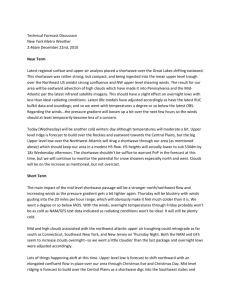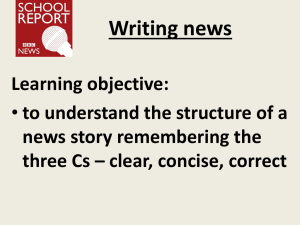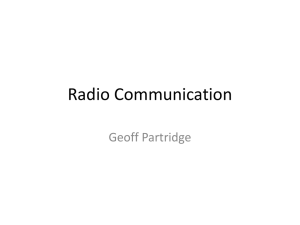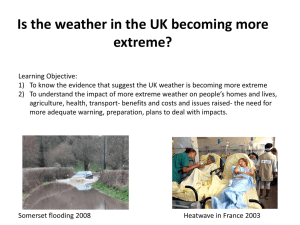The Enduring Importance of Shortwave for International
advertisement
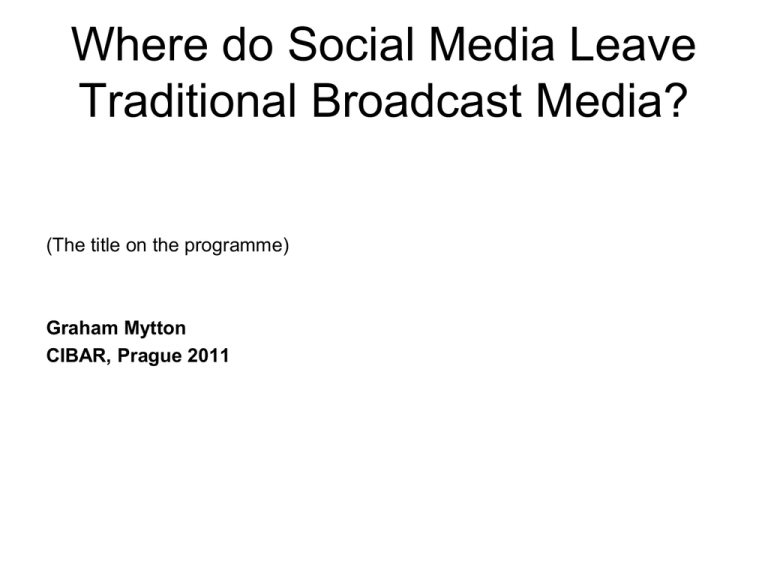
Where do Social Media Leave Traditional Broadcast Media? (The title on the programme) Graham Mytton CIBAR, Prague 2011 The Enduring Importance of Shortwave for International Broadcasting (My more precise title!) Graham Mytton CIBAR Conference Prague 2011 1985 London 1998 Paris 1986 Paris 1999 Geneva 1987 Hilversum 2000 Cologne 1988 Cologne 2001 Washington 1989 Paris 2002 Stockholm 1990 Madrid 2003 Moscow 1991 London actually in Jan 1992 2004 London 1992 Lisbon 2005 Montreal 1993 Munich 2006 Melbourne 1994 Berne 2007 Paris 1995 Washington 2008 Manila 1996 Prague 2009 Bonn 1997 London 2010 2011 Amsterdam Prague List of CIBAR conferences “Shortwave broadcasting has been in gradual but accelerating decline for years;” But traditional radio has not been replaced BBC Global Audience 2010 • 161 million weekly listeners • In 1980 it was 100 million • 53% of the global audience in 2010 accessed BBC WS on shortwave. That was then 85 million listeners, the largest single group of BBC users on any “platform”! • This was in spite of massive cuts to shortwave over the previous decade John Tusa, Managing Director BBC World Service 1986 - 1992 If shortwave had been or discovered today instead of eight decades ago it would be hailed as an amazing new technology with great potential for the world we live in today. Access to locally retransmitted services can be and often are blocked • Nigeria does not allow any local rebroadcasts of news • Ivory Coast, Azerbaijan, both Congos and several other countries have blocked local rebroadcasts when local circumstances have changed and governments in these countries have not wanted outside “interference” Shortwave use declines when political circumstances change! • In Portugal, Greece, Former Yugoslavia, former East European states and many others, when free media emerged, there was a massive fall in shortwave use • But shortwave is still a major means of reception in many parts of the world. It is showing amazing vitality and survival • It has survived massive cut backs and the talking down of it by many senior broadcasters who ought to know better! Global Shortwave Access and Use • 2 billion people in the world have access to at least one shortwave capable set at home • 300 million people use shortwave on a weekly basis to access radio services • When crises happen, as they often do, the number is increased many times over • Shortwave use declines not because of new technologies but because of local political changes • More freedom means less shortwave use! •BBC World Service issued some promotional postcards a few years ago •It displayed them on the walls all around the building •The photos were of well known people, including world leaders in business, politics, entertainment, arts and more •The main way these WS users listened in the way they said they did was on shortwave. •The photos soon had to be removed or withdrawn. The BBC was cutting back on the means whereby they could continue to listen Huge changes in technology over the past 20 years • But another change has had as much, if not more, impact on human communications • It has been the deregulation of media, especially broadcast media • In 1996, when the process had been going for about 6 years I produced the following charts, showing how control on broadcast media had changed, globally and region by region with predictions for the next 6 years. The charts show first what the situation was like in 1990, then 1996 and then a prediction for 2002 Definitions: Monopoly means where radio and TV are under state control with little or no exception. This situation was true in most countries in Africa and Asia as well as communist states in Europe Pluralist means where the state allows private radio and TV with varying degrees of regulation but where independent voices are allowed. Transitional means that a country is moving from Monopoly to Pluralist The World's Radio and TV Markets in 1990 Pluralist: 60 countries Monopolies: 98 countries Transitional : 13 countries The World's Radio and TV Markets in1996 Monopolies 49 countries Pluralist 90 countries Transitional 53 countries The World's Radio and TV Markets in2002 Monopolies 21 countries Transitional 26 countries Pluralist 110 countries Supply and Demand: The Relationship of BBC Weekly Reach to the Availability of Domestic Radio Channels 50 45 BBC Weekly Reach 40 35 I think I showed this chart first in 1992. It plots weekly audiences for any BBC WS listening against the number of radio stations in that country’s capital city. Clear evidence that while a state monopoly (with few radio services) does not guarantee a large audience, large audiences are not achieved where there is a lot of local choice 30 25 20 15 10 5 0 0 10 20 30 40 Number of domestic radio stations in main or capital city 50 60 Shortwave transmitters Now Obsolete Surely! Satellite Dishes seen everywhere. These are in Freetown Sierra Leone Mobile Phones: The fastest ever growth in communications technology? Millions being spent on further promotion and competition
